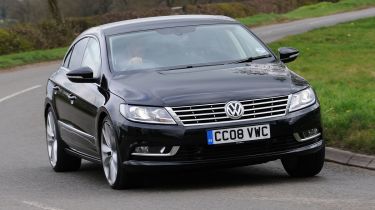Volkswagen CC 2.0 TDI
Revisions set the stylish four-door coupe further apart from the Passat
Just like the DS5, the Volkswagen CC is a stylish alternative to a conventional saloon. Yet this car is different as it already has a proven track record with fleet buyers, many of whom were won over by the low emissions and generous kit of the original Passat CC.
To ensure the CC continues to compete with the usual suspects from Audi and BMW at the top of company car wishlists, it has been refreshed, with sleek styling upgrades, even more kit and improved refinement.
The familiar front end has been gently revised to keep it looking sharp. A wider grille now sits flush with the reshaped headlights and the bumper has neat chrome inserts. Our range-topping GT test car also had 18-inch alloy wheels, integrated foglights and heat-insulating privacy glass.
These changes are intended to move the CC closer to the brand’s flagship saloon (the Phaeton), but it looks pretty ordinary parked alongside the striking DS5. Some buyers will prefer the VW’s understated charm to the more extroverted Citroen, but in a class where desirability is a key factor, this conservative approach may count against the CC.
The interior suffers from the same lack of charisma. Minor changes to the clock and climate controls aren’t enough to prevent it feeling dated – especially compared to the lavish DS5 and sporty BMW. On the plus side, the standard leather sports seats are very supportive and the driving position is great. Interior build quality is excellent, too, but most of the trim is still shared with the more humdrum Passat.
Used - available now

2023 Ford
Kuga
47,524 milesAutomaticPetrol2.5L
Cash £19,300
2020 Land Rover
Range Rover Velar
63,000 milesAutomaticDiesel3.0L
Cash £25,995
2020 BMW
X3
48,000 milesAutomaticDiesel2.0L
Cash £23,995
2020 BMW
X3
40,700 milesAutomaticDiesel3.0L
Cash £33,995Despite being 118mm shorter than the DS5, the CC provides similar rear passenger space, although the 320d has the edge over both cars when it comes to headroom. The VW’s 452-litre boot is the smallest on test and a high lip and narrow opening make it tricky to load.
On paper, the CC should offer a better balance of comfort and agility than the stiff and crashy Citroen. Our GT-spec test car had Adaptive Chassis Control (ACC) as standard. This allows the driver to choose one of three settings: Normal, Comfort and Sport. In Comfort, the CC rode better than the DS5 on bumpy roads. The responsive 168bhp diesel engine and slick DSG twin-clutch gearbox meant it was also quicker at the track, taking 8.5 seconds to sprint from 0-60mph.
Yet the CC falls well short of the BMW’s dynamic flair. The weighty steering inspires more confidence than the DS5’s and the CC feels like a more precise driver’s car than the Citroen, but there are no steering wheel paddles for the DSG gearbox and it can feel slow-witted in automatic mode.
However, it’s also the least efficient car here: a 144g/km CO2 output pushes up the price of ownership for company buyers. So can the sensible but pricey VW beat the stylish but flawed DS5?
Details
Chart position: 3
WHY: Changes aim to make VW CC the default choice for style-conscious company drivers. Passat name has been dropped, but has it gained some charisma?







